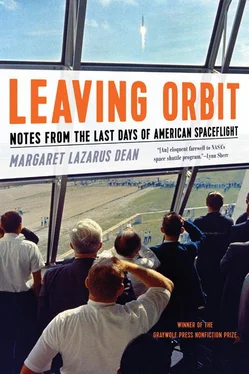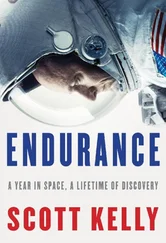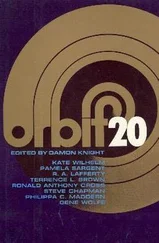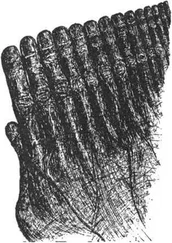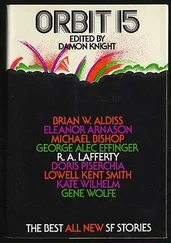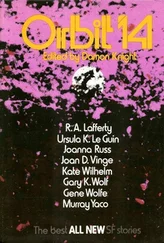As we drive toward the VAB, Omar tells me more about his job. He is one of the thousands of people who work at the Cape doing various things that need to be done in order to get spaceships off the ground—in his case, making sure that only authorized people get access to Discovery at the various points along its work flow and making sure that any object that enters the crew cabin comes out again. His official title is orbiter integrity clerk. Delightfully, part of his job involves watching for birds to make sure they don’t damage the vehicle on the launchpad (this responsibility was added in the nineties after woodpeckers damaged an external tank to such an extent that it had to be rolled back to the VAB for repairs). Omar loves what he does—I know this already from the cumulative impression of his Facebook postings—and he takes pride in what his employer does, more than anyone else I know. In another context, a person with his job description might be called a security guard, but I would not call Omar that. Partly because in his job the stakes are so high—a single errant screw could endanger the mission, the spacecraft, and the astronauts. But also because Omar’s pride in his work here, like that of every single person I have ever met at the Cape, makes the job title itself almost irrelevant. Omar works on the space shuttle. Specifically, he works on Discovery , and though he is modest and unassuming by nature, I have heard him refer to Discovery in conversation as his , as in, with reference to a specific mission, “that was my bird.”
Now Discovery has only one mission left to go. This upcoming flight was supposed to be the final mission for the shuttle, but then NASA announced one more would follow, on Endeavour. Now rumor has it they might add one more, which, if it happens, will be on Atlantis. I ask Omar as we drive up Kennedy Parkway whether this adding-on will continue, whether NASA can tack on one more mission, then one more mission, indefinitely.
“I don’t think so,” Omar says. “The site in Louisiana that makes the external tanks delivered the last one, and now they’re shutting the facility down. If NASA wanted to contract for more, they’d have to start it up again.”
“Oh,” I say, disappointed. “I’d hoped they might be able to keep extending it.”
“I mean, that’s just what I’ve heard,” Omar clarifies. “I don’t know that for sure.” As I get to know Omar, I will continue to be impressed by his insistence on differentiating what he knows to be true from claims based on unofficial sources, rumor, or his own extremely educated guesses. He is an epistemological purist, an orbiter integrity clerk of truth.
“It seems like a waste to retire the shuttles when they still have life in them,” I say experimentally. I have never known Omar to make a negative comment about NASA, and I’m wondering whether he’ll open up a bit more in person.
Omar nods, but doesn’t elaborate. He knows he will almost certainly be laid off after Discovery ’s retirement in a few months. Yet for now, he’s always at work. For now, the Kennedy Space Center is bustling, as it has been for forty-eight years, with the effort to prepare spaceships for multiple missions simultaneously.
There will be two or at most three more launches, and then all this will be over. I think about my favorite books about spaceflight, those writers who faced the task of rendering an exciting, brand-new, seemingly limitless future. They struggled to define what these achievements were going to mean, where all this innovation was going to lead us. And where exactly has it led? Even with the knowledge I’ve spent the last ten years gaining, I realize I still don’t know. If Mailer and Wolfe and Fallaci were here, what would they say? The more I think about it, the more clearly I can imagine them—Mailer cussing and snarling at everything, Wolfe sweating through his trademark white suit, Fallaci bristling at all the no-smoking signs. All of them disgusted that the future they worked so hard to understand and to put on the page has been canceled.
What would it mean to go to the last launch and write about it the way Mailer wrote about the launch of Apollo 11? To spend time with the people involved and write about them the way Fallaci did? The last launch of the space shuttle would unfold with all the glory and boredom and strangeness of Apollo 11, would provide an ending to the story. I think about how time-consuming and expensive it would be to try to do this—after all, fewer than half of shuttle missions launch on the first attempt; some have taken as many as seven attempts (separated by days or weeks or months) to get off the ground. A person could travel to Florida five or six separate times and never manage to catch a launch at all. Some space fans have suffered similar bad luck.
* * *
In humid weather, clouds sometimes gather within the unprecedented single-story height of the Vehicle Assembly Building. Technicians feel raindrops, then look up from their work assembling the spacecraft to find that it’s raining lightly, the far-off ceiling windows obscured by indoor rain clouds.
Omar has never seen this himself, he tells me when I ask, but he has heard that it happens. He pulls into the enormous parking lot, and we pass the point where the tour buses always stop, where I’ve stood twice to try to get the VAB into my camera’s frame. It gives me a thrill to ride right past that point and keep going, all the way up to the gate surrounding the building. We pile out and approach the VAB. I soon give up trying to tip my head back to take it in, as doing so impedes my ability to walk in a straight line. The entrance is like that of any large industrial building—heavy rolling door, polished concrete floor, safety signs posted on either side. BICYCLES PROHIBITED IN VAB. HAVE A SAFE DAY. But then I step into the interior, which is not like any other space in the world. I hold my breath while I follow Omar across the threshold and look up.
The sweeping vertical expanses made possible by flying buttresses in the twelfth century were meant to draw the eye up, and thus the spirit—the architecture was meant to stir the emotions and connect visitors with God. I look up. Other visitors, other NASA families, stream in on either side of me while I stand and gape. The space comes into focus in all its unphotographable enormousness. I have studied many images of the VAB, but I have never before quite grasped the way it all fits together, the way the four high bays mark four corners divided by the transfer aisle through the center of the building. Like all cathedrals, the Vehicle Assembly Building is laid out like a cross.
I can recite all the tour guides’ facts about the VAB: Each of its four doors opens wide enough to take in the United Nations building and tall enough to take in most skyscrapers. Its volume is three-and-a-half times that of the Empire State Building. Its roof is big enough to contain more than six football fields.
But I couldn’t ever have pictured quite how big it really is. Looking up, I see floor after floor of girders with their orderly rows of little white work lights twinkling. I peer into one of the four high bays in which the rockets are stacked. The ceiling windows whirl at a dizzying height that seems higher than the zenith of the sky itself. The human beings at the other end of the building disappear, too small to make out, even though we are all in the same room. In his book about Apollo 11, Norman Mailer wrote that the Vehicle Assembly Building may be the ugliest building in the world from the outside, but that from the inside it was a candidate for the most beautiful. I can finally see what he means.
This is where spaceships are assembled, every rocket to the moon, every space shuttle. I feel the enormity of the work that has been done here, the days and weeks and years of work, birthdays missed, children grown up, the endless and delicate work of assembling machines for going to space. I feel tears form in my eyes. I have been to Notre Dame and the Supreme Court and the Grand Canyon and Fallingwater and other sites imbued with a special grandeur, an urgent frisson of importance and here-ness, but none of them has made me cry. I look around at the other Family Day visitors chatting, wandering, pointing things out to each other in normal tones. None of them are weeping. I dry my eyes, hoping none of my companions have seen. Most people are milling through, in one door and out the other. I try not to judge them too harshly. To be fair, just to walk from one end of the building to the other does take a significant amount of time.
Читать дальше
